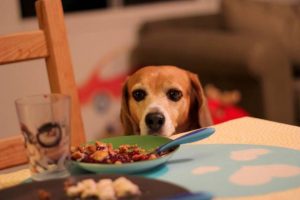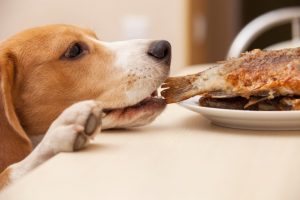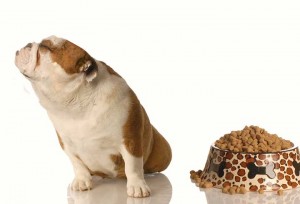Posts Tagged ‘table scraps’
Why You Should Keep Your Pets Away from the Table This Thanksgiving
 With Thanksgiving approaching, there is no doubt that you pup is going to want to partake in the festivities. However, feeding your pup even a few tasty treats from the table is definitely not the way. More often than not, table food is typically too fatty for a dog’s digestive system and can result in severe stomach upsets. To keep your dog safe and healthy this holiday season, keep the following in mind.
With Thanksgiving approaching, there is no doubt that you pup is going to want to partake in the festivities. However, feeding your pup even a few tasty treats from the table is definitely not the way. More often than not, table food is typically too fatty for a dog’s digestive system and can result in severe stomach upsets. To keep your dog safe and healthy this holiday season, keep the following in mind.
Oily and fatty foods, which are often found on OUR tables, can lead to severe dog health problems such as diarrhea, vomiting, and pancreatitis. Even worse, there are several people foods that can be toxic to dogs. For example, onions or any food prepared with them are unsafe for dogs and should never be given to them. Moreover, dogs that are constantly fed with table scraps have the tendency to become dependent on them. Dogs that eat table scraps may start refusing to eat regular dog food. Feeding your pet with table scraps can also cause them to develop bad behaviors such as begging. If you wish to reward your pet for good behavior, give them treats made for them.
If for some reason you just cannot stop feeding your pet table scraps, follow the following rules:
No junk food! Never feed your dog junk foods such as fries, potato chips, leftover pizza, or candies. Your dog should only get healthy food items like steamed or baked potatoes, plain rice, oatmeal, bits of cooked chicken or turkey, finely chopped or steamed unseasoned veggies and certain fresh fruits.
Moderation is key! If you like giving your dog healthy people food, don’t forget to factor his meals into his daily calorie requirement, then, feed your pooch less of their own dog food so they don’t gain weight. Be sure to balance their diet since your dog still needs their regular food. Just try giving less of it on times when you are feeding him with healthy table scraps.
Watch out for toxic food! Above all, you should avoid foods that have been found to be poisonous to dogs. These include, for example, raisins, onions, chocolate, cooked bones, fruit pits, and walnuts. For a more complete list, check it out here.
If you wish to feed your dog human food, a great way to do it is to cook a recipe specifically designed for dogs. These often include scraps that pose no harm to your dog, including rice, cooked eggs, carrots, cheese, peanut butter, berries, chicken, green beans, seedless watermelon, and bananas.
As always, feel free to reach out to Olsen Veterinary Clinic with any questions at 618-656-5868.
The Trouble With Table Scraps
 If the holidays are at your place like it is at our place, it is family, food and football—not necessarily in any order. Unfortunately many pet owners think that holiday time means giving their pets a taste of the tender morsels that they partake in. Before you give table scraps – STOP and think a minute. These high-fat type of foods or foods that your pet is not accustom to can lead to disaster if given to our pets. Just a small amount can lead to pancreatitis in our pets, which can lead to terrible consequences.
If the holidays are at your place like it is at our place, it is family, food and football—not necessarily in any order. Unfortunately many pet owners think that holiday time means giving their pets a taste of the tender morsels that they partake in. Before you give table scraps – STOP and think a minute. These high-fat type of foods or foods that your pet is not accustom to can lead to disaster if given to our pets. Just a small amount can lead to pancreatitis in our pets, which can lead to terrible consequences.
If your pet develops pancreatitis, the treatment focuses on supportive care, such as controlling nausea and vomiting, preventing further dehydration or imbalances in the blood and feeding a low-fat nutritious diet. Serious cases may mean hospitalizing your pet for a few days or longer. Unfortunately, many other diseases have these clinical signs and it makes it a challenge determining if your pet has pancreatitis.
Early diagnosis and treatment is the key to preventing other complications such as dehydration and other systemic diseases.
As your pet ages, he can develop intolerances to certain foods so it may be best to just feed high quality pet foods with little variance and only allow healthy pet treats in moderation.
Most owners know that a only a good quality diet is necessary for their pet, however sometimes good intention visiting guests can complicate things by letting them finish their plate or giving them all of the trimmings off the turkey because they couldn’t resist.
This kind gesture could lead to the previous mentioned consequences.
To avoid pancreatitis a pet owner may take precautions to prevent it. This may include:
- Ask guests to not feed your pet table scraps
- Have healthy treats present if your guests can’t resist
- Keep pets out of the garbage
- Place your pet in a quiet room during mealtime or feed it prior to you and your guests eating
Holidays are all about celebrating and pets are a big part of our family. Kind gestures like feeding table scraps can put a damper on the celebrating if it involves an emergency trip to your veterinarian. So if you set ground rules and make your guests aware of the restrictions for your pets, we can have a safe and happy holiday season.
Olsen Veterinary Clinic is committed to the health and happiness of your pet. For questions, or to schedule an appointment, contact us here.
How To Conquer Mealtime With A Picky Pet
 Do you have a picky pet? There is actually a difference between a picky and a finicky eater. A picky eater will occasionally refuse to eat and can easily be tempted with a slice of cheese added to his bowl. A finicky eater is a dog that has decided to give up dog food for good.
Do you have a picky pet? There is actually a difference between a picky and a finicky eater. A picky eater will occasionally refuse to eat and can easily be tempted with a slice of cheese added to his bowl. A finicky eater is a dog that has decided to give up dog food for good.
Have you ever wondered why your dog refuses to eat its food? If you give your pet treats or table scraps all day, it may just turn up its nose if you give plain dog food. If you are going to give your pet bacon or steak for breakfast, would you blame it for shying away from just the dog food? Chances are you might just be able to answer your own question by looking in the mirror. By caving in and giving those treats, you may have created a “monster” that becomes finicky or picky.
If there is no disease or illness present, then you just may have a finicky or picky eater. A picky dog will maintain its healthy weight, be alert and playful. It will also have a shiny coat, and is usually not a concern. When it suddenly stops eating, dropped a few pounds, and has a less lustrous hair coat, these symptoms may be a sign of illness or disease. In this situation, I would recommend a veterinary check-up as soon as possible.
So if you just have a finicky eater, here are some ways to persuade it to eat.
- Tone down the treats- A finicky eater is more likely to eat if it is not comparing its dog food to a liver treat.
- Feed often- Try feeding smaller amounts of its regular food three to four times a day. Set the food out for 30 minutes. If it isn’t eaten, pick it up and offer it again later. By doing this, you are helping your dog learn that no other option will exist. Don’t give in! Eventually, your dog will eat if it is hungry.
- Exercise- It is good for so many things and it increases a dog’s hunger. Try always exercising your pup before a meal.
- Spay or Neuter- If you haven’t already, fix your pup. Besides the many health and behavioral benefits, it can help prevent a finicky eater.
- Make it positive- Always make feeding a positive experience. By keeping feeding time positive, the overall experience will also provide positive reinforcement for your pet. Praise your dog when he eats his food and give him attention only after the meal is gone.
- Keep it quiet- Feed your dog in a quiet area without children or other dogs mulling around.
- Try different times- Some dogs eat better in the afternoon, others eat better an hour after you are home. Test it and see what time and situation work best for yours.
- Resist temptations- Try the other tips before giving into the urge to tempt your pup to eat with people food. You’ll find that a few pieces of cooked chicken will perhaps tempt him for a time but he’ll soon grow bored of that too.
Above all, be patient with your dog and watch it closely for signs of illness. Work with your veterinarian or a dog behaviorist if you are concerned about its health. Time, self-discipline, and consistency will do much to cure the finicky eater. Eventually, “my dog won’t eat” will become a thing of the past! If you are still struggling, contact our office so we can help!
